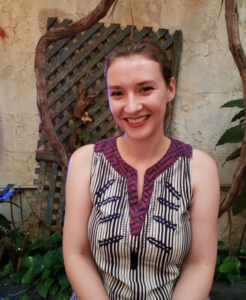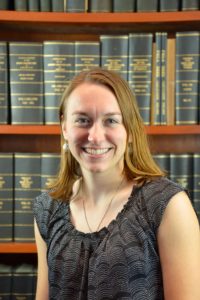Current Contributors (2019-2020)
Portia Quiroz Seddon, “Parenting and Pedagogy”
In this series, I reflect on my first year returning to teaching after parental leave, and the major effect that becoming a mother has had on my work as an educator. In addition to the obvious labor and time-management challenges of balancing teaching, grading, research, and writing, with the all-encompassing task of raising a human, becoming a mother has altered my experience in the classroom and my relationship with my students—a change that signals the need for renewed pedagogical reflection.
Portia Quiroz Seddon is a fourth-year student in the Ethnomusicology Program. She has taught at Hunter College, CUNY in the Women & Gender Studies Department since 2012, and in the Music Department since 2017. Her research is on music and citizenship discourse in the Mexican immigrant community in New York City. Twitter: @revoltingwoman Instagram: @portia_q
Dhipinder Walia, “What is Diversity, really? Student Writing and the Possibility for Actual Diversity.”
Important work like multilingual writing practices, interrogating and undoing racist logics, and collaborative learning don’t just happen. You have to make room for it, so that’s what I’m doing this semester. Specifically, I am: Asking students to define the way they’ll engage with Standard American English, providing reading material that is written by and about people of color, and designing a classroom writing project that relies on active student participation and minimal instructor input. By sharing my successes and failures to “make room” I hope to identify concrete methods of doing meaningful diversity work in the classroom.
Dhipinder Walia is an English PhD candidate at the Graduate Center as well as a full-time lecturer at Lehman College. Her research interests include the rhetoric of diversity both in the classroom and in the university. For fun, she likes to memorize dialogue from episodes of The Office and lyrics from the underrated K-Ci & Jo-Jo album, Love Always.
Guest Editor Series (2019-2020)
Jessica Brodsky, Patricia Brooks, and Elizabeth Che
“Teaching and Assessing Media Literacy in College Students”
College students are typically viewed as digital natives, but lack skills to evaluate information they encounter online (McGrew et al., 2018). This blog series presents strategies and case studies for integrating media literacy instruction and assessment into general education courses. Media literacy is defined as the ability to access, analyze, evaluate, create, and act on information found online (e.g., articles, photos, videos, social media posts; Hobbs, 2010). Our teaching materials not only aim to foster media literacy, but also aim to develop students’ facility in using online educational resources. We offer suggestions for adapting materials for courses across disciplines.
Jessica Brodsky is a doctoral student in the Educational Psychology Program at the Graduate Center. She serves as Deputy Chair of the Graduate Student Teaching Association (APA Division 2). Her research interests are in media literacy assessment and instruction, and development of online resources for teaching students how to read scientific texts. Twitter: @jebrodsky
Patricia Brooks is Professor of Psychology at the College of Staten Island and the Graduate Center. She serves as the Faculty Advisor to the Graduate Student Teaching Association (APA Division 2). Her research interests pertain to individual differences in language learning over the lifespan and development of effective pedagogy to support diverse learners.
Elizabeth Che is a doctoral student in the Educational Psychology Program at the Graduate Center. She serves as the Chair of the Graduate Student Teaching Association (APA Division 2). Her research interests include the use of Wikipedia editing to develop students’ writing and other teaching practices that foster development of workforce relevant skills. Twitter: @elizabethsche
Past Contributors
Sarah Hildebrand, “Prison Pedagogy”
Based on my experience teaching English Composition at Otisville Correctional Facility (a medium-security men’s prison in upstate New York), this series will reflect on education as a form of rehabilitation, and will consider the unique pedagogical challenges of carceral settings. Posts in this series will explore the logistical issues inherent to prison classrooms, but also what it might look like to develop a trauma-informed pedagogy that attends to the systemic injustices faced by incarcerated students and their educators.
Sarah Hildebrand is a Ph.D. candidate in English at The Graduate Center where she researches trauma theory and narratives of sexual violence. She teaches at Lehman College and in John Jay College’s prison-to-college pipeline program. She has recently completed fellowships through the Modern Language Association and the Vera Institute of Justice.
Ashley Marinaccio, “Creative Resistance: Theatre Pedagogy in the Classroom (and the Everyday)”
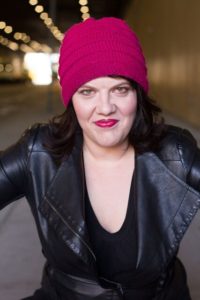 Our current socio-political climate demands creative resistance and I am interested in a theatre that does just that. This series investigates the role of theatre in teaching activism and civic engagement to students both inside and out of the classroom. Involvement in theatre and arts programming has proven to enhance communication, reading and writing, as well as develop empathy and conflict resolution skills. This series will explore how theatre programming, processes, games, exercises, and principles can be used to activate students’ socio-political engagement and critical thinking skills.
Our current socio-political climate demands creative resistance and I am interested in a theatre that does just that. This series investigates the role of theatre in teaching activism and civic engagement to students both inside and out of the classroom. Involvement in theatre and arts programming has proven to enhance communication, reading and writing, as well as develop empathy and conflict resolution skills. This series will explore how theatre programming, processes, games, exercises, and principles can be used to activate students’ socio-political engagement and critical thinking skills.
Ashley Marinaccio is a Ph.D. student in Theatre and Performance at The Graduate Center. She is earning a certificate in Interactive Technology and Pedagogy (ITP) and a New Media Lab Student Researcher. Her research focuses on theatre in areas of conflict and war zones. In 2018 she received a Provost Pre-Dissertation Research Grant to work in Palestine and Jordan. She is a director, performer, playwright, and photographer. Learn more about her at www.ashley-marinaccio.com.
Chinonye Alma Otuonye, “Identity in the Classroom”
 Graduate school, for me, has been as much about preparing to become a competent and compassionate teacher as it has been about becoming a scholar. This series will be an exploration of the importance of identity in the educational landscape. Posts will focus on the various identities that have to be navigated within the student-teacher dynamic and the responsibilities present in being both a student and teacher.
Graduate school, for me, has been as much about preparing to become a competent and compassionate teacher as it has been about becoming a scholar. This series will be an exploration of the importance of identity in the educational landscape. Posts will focus on the various identities that have to be navigated within the student-teacher dynamic and the responsibilities present in being both a student and teacher.
Chinonye Alma Otuonye is a doctoral student in Cultural Anthropology at the Graduate Center. She has previously served as a Teaching Assistant at Barnard College. Her research interests are focused on identity formation and political movements in relation to nationhood within Southeastern Nigeria.
Guest Editor Series (2018-2019)
Jesse Rice-Evans, Guest Editor, “What is ‘Access’?”
 This series invites teachers to expand definitions of access, which remains startling narrow in higher education. Structural barriers—this very inaccessibility, including attendance requirements, traditional scheduling demands, the intersections of chronic illness and emotional/mental health—make it difficult for disabled students to succeed by any metric. Rigid institutional guidelines for requesting access further alienate disabled students, and pedagogical training rarely broaches the topic of disability. And what of disabled faculty? We’ll hear from writers who straddle these messy lines and how they’ve integrated access into their reflexive pedagogical ethics.
This series invites teachers to expand definitions of access, which remains startling narrow in higher education. Structural barriers—this very inaccessibility, including attendance requirements, traditional scheduling demands, the intersections of chronic illness and emotional/mental health—make it difficult for disabled students to succeed by any metric. Rigid institutional guidelines for requesting access further alienate disabled students, and pedagogical training rarely broaches the topic of disability. And what of disabled faculty? We’ll hear from writers who straddle these messy lines and how they’ve integrated access into their reflexive pedagogical ethics.
Jesse Rice-Evans (she/her/hers) is a queer femme rhetorician and doctoral student at The Graduate Center researching intersections of language, disability, and digital culture. She is the author of several chapbooks, and her first full-length collection of poetry is forthcoming from Sibling Rivalry Press in 2019.
Guest Editor Series Contributing Writers (2018-2019)
Zefyr Lisowski
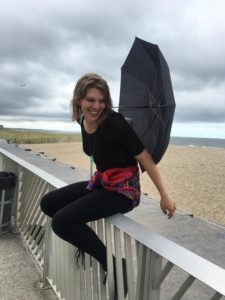 Zefyr is a writer, artist and educator currently based in New York. She’s a poetry editor for Apogee Journal, an instructor and MFA candidate at Hunter College, and the author of BLOOD BOX, winner of the Editor’s Choice Award from Black Lawrence Press (forthcoming 2019). She’s presented on stages and conferences across North America, including as a featured presenter at the Art of Trans, Gender-Diverse, and Two-Spirit Lives conference at McGill University. Find her at @zefrrrrrrr or at zeflisowski.com.
Zefyr is a writer, artist and educator currently based in New York. She’s a poetry editor for Apogee Journal, an instructor and MFA candidate at Hunter College, and the author of BLOOD BOX, winner of the Editor’s Choice Award from Black Lawrence Press (forthcoming 2019). She’s presented on stages and conferences across North America, including as a featured presenter at the Art of Trans, Gender-Diverse, and Two-Spirit Lives conference at McGill University. Find her at @zefrrrrrrr or at zeflisowski.com.
Chy Sprauve
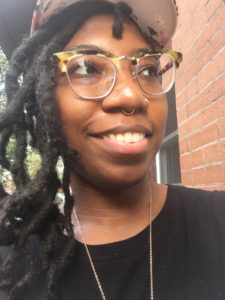 Chy is a fourth-year doctoral student in English and Composition Rhetoric and an adjunct instructor at Medgar Evers College. Chy’s dissertation work concerns the performance of care in the freshman-year writing classroom. Areas of interest include critical pedagogy, aesthetics and affect studies, and divination systems as methods of healing.
Chy is a fourth-year doctoral student in English and Composition Rhetoric and an adjunct instructor at Medgar Evers College. Chy’s dissertation work concerns the performance of care in the freshman-year writing classroom. Areas of interest include critical pedagogy, aesthetics and affect studies, and divination systems as methods of healing.
Andréa Stella
 Andréa (she/her/hers) is a queer rhetoric scholar at the Graduate Center studying anti-racist STEM pedagogy, autoethnography, and reflexive/collaborative teaching. A born New Yorker, she holds an MPH from the CUNY School of Public Health and an MFA from the City College of New York. She’s currently an adjunct assistant professor of Writing Composition at CCNY, and previously ran a harm reduction syringe exchange in the East Village.
Andréa (she/her/hers) is a queer rhetoric scholar at the Graduate Center studying anti-racist STEM pedagogy, autoethnography, and reflexive/collaborative teaching. A born New Yorker, she holds an MPH from the CUNY School of Public Health and an MFA from the City College of New York. She’s currently an adjunct assistant professor of Writing Composition at CCNY, and previously ran a harm reduction syringe exchange in the East Village.
Alicia Andrzejewski, “Pregnancy and Pedagogy”
Teaching while pregnant poses a particular set of challenges for people in academia. From daily commutes on public transportation; to adapting past pedagogy to accommodate emotional and physical exhaustion; to communicating with students about a private life that is no longer private; to using a web-enhanced classroom to help create boundaries and accessibility—this series attends to the rich and diverse experience of teaching at CUNY through the lens of pregnancy, also speaking to broader issues of professionalism and gender in the academy.
 Alicia Andrzejewski is a PhD candidate in the English program at the Graduate Center, City University of New York. Her current project examines what she calls “queer pregnancies” in Shakespeare’s plays—pregnancies that resist how reproduction was, and continues to be, culturally organized and that allow homoerotic desires and bonds to flourish. Her work is forthcoming or has appeared in the peer-reviewed journals Shakespeare Studies and The Tennessee Williams Annual Review, and she is also a contributing writer for Synapsis.
Alicia Andrzejewski is a PhD candidate in the English program at the Graduate Center, City University of New York. Her current project examines what she calls “queer pregnancies” in Shakespeare’s plays—pregnancies that resist how reproduction was, and continues to be, culturally organized and that allow homoerotic desires and bonds to flourish. Her work is forthcoming or has appeared in the peer-reviewed journals Shakespeare Studies and The Tennessee Williams Annual Review, and she is also a contributing writer for Synapsis.
Ana Flávia Bádue, “Teaching and Research: How to Put Them in Dialogue?”
Higher education is where research and teaching are combined, but sometimes it is difficult to realize how to put them together. In this series I will explore concrete forms of bridging research with classroom dynamics. In our courses, we can use our own research as a pedagogical tool; we can invite students to engage in collaborative research or introduce them to research practices; we can also shape our courses around our research topics. My main goal is to show that teaching is not a burden for researchers, and that both students and teachers-researchers can benefit if we put them together.
 Ana Flávia Bádue is a doctoral student in Cultural Anthropology at the Graduate Center. She has taught Political Sociology at ETEC Cepam in Brazil and now she teaches Introduction to Cultural Anthropology at Baruch. Her research interests focus on the relations between land grabbing and financialization of farmland in Brazil.
Ana Flávia Bádue is a doctoral student in Cultural Anthropology at the Graduate Center. She has taught Political Sociology at ETEC Cepam in Brazil and now she teaches Introduction to Cultural Anthropology at Baruch. Her research interests focus on the relations between land grabbing and financialization of farmland in Brazil.
Rachel Bogan, “Creating an Activist Classroom”
Like many instructors, I often struggle with the question: Am I ‘enough’ of an activist? I know my students—though far from apolitical—rarely consider themselves activists. As I refreshed my syllabus, I reflected on how current events, like the ending of DACA, might impact my students, and decided to use the classroom as a space to assemble activism. This series will trace my efforts to create an activist classroom. It will explore questions like: How can I extend my activism into the classroom? How do I integrate current events into my lesson plans? Why do/don’t students consider themselves activists?
 Rachel Bogan is a doctoral candidate in Sociology at the Graduate Center and an Instructional Technology Fellow. Her research explores the food-as-medicine movement, specifically how New Yorkers negotiate practices of food as medicine. When not ‘doing’ sociology, you can find her on a yoga mat or walking her dog.
Rachel Bogan is a doctoral candidate in Sociology at the Graduate Center and an Instructional Technology Fellow. Her research explores the food-as-medicine movement, specifically how New Yorkers negotiate practices of food as medicine. When not ‘doing’ sociology, you can find her on a yoga mat or walking her dog.
Inés Vañó García, “Students’ Voices and Choices: Exploring Experimental Teaching and Learning Practices”
My proposed series is based on my final project for the Interactive Technology and Pedagogy Certificate on which I will be working this fall semester. My project involves working with Spanish Heritage Language Learners at Lehman College to become producers of place-based and task-based teaching materials for Spanish learners. I will be sharing my personal experiences regarding my ongoing project and reflecting on the challenges of the elaboration, development and implementation of my pedagogical practices, and the use of digital technology in the classroom.
 Inés Vañó García is a Ph.D. student in the program in Latin American, Iberian and Latino Cultures at the Graduate Center. Her research focuses on the institutionalization of the Spanish language in the U.S. during the 20th century. She is interested in language ideologies and the political history of the Spanish language. Inés is a Humanities Alliance Graduate Fellow, currently teaching at Lehman College.
Inés Vañó García is a Ph.D. student in the program in Latin American, Iberian and Latino Cultures at the Graduate Center. Her research focuses on the institutionalization of the Spanish language in the U.S. during the 20th century. She is interested in language ideologies and the political history of the Spanish language. Inés is a Humanities Alliance Graduate Fellow, currently teaching at Lehman College.
Alison Walls, “Intellectual Ideals and Material Realities”
This series aims to unpack a conflict facing many community college faculty: namely, the tension between the instructors’ ideal of engaging students intellectually with their subject matter, and the material realities that more often motivate students’ presence in the classroom. My series will consider how to get past the negative impact of worries surrounding grades and future careers that can interfere with student learning. It also explores ways of stimulating students’ personal engagement with the subject—which is ultimately more beneficial to their learning—while remaining mindful of the very real material concerns and responsibilities driving student aspirations.
 Alison Wells comes from Wellington, New Zealand. She is a doctoral candidate in Theatre at The Graduate Center. She has previously taught at LaGuardia Community College and is currently teaching at Baruch; she is also a Humanities Alliance Teaching Fellow. Alison’s background is in acting and directing and she holds an MFA from Sarah Lawrence College.
Alison Wells comes from Wellington, New Zealand. She is a doctoral candidate in Theatre at The Graduate Center. She has previously taught at LaGuardia Community College and is currently teaching at Baruch; she is also a Humanities Alliance Teaching Fellow. Alison’s background is in acting and directing and she holds an MFA from Sarah Lawrence College.
Eileen Liang, “The Anxious Instructor”
As a terribly anxious first-time instructor, I envision this series as a record of my growth, as I develop the skills I need to manage my nerves, both at the front of the classroom and while preparing for lessons. The truth is, I’m pretty sure I’m not the first person, nor will I be the last, to feel this way, and I’d like for my posts to be both a resource and a reassurance: you are not alone. Taken together, I hope the posts will serve as a handy guide for succeeding in the classroom despite anxiety… and learning to love (or at least not fear) the act of teaching.
 Eileen Liang is a doctoral student in Sociology at the Graduate Center. Her research interests are broadly based at the intersection(s) of food and race, and exploring hunger as oppression. She is interested in larger narratives of identity and power, and discovering ways to disrupt oppression and generate resistance. When not busy worrying about teaching, she likes watching documentaries, reading autobiographies and picture books, and kneading bread dough.
Eileen Liang is a doctoral student in Sociology at the Graduate Center. Her research interests are broadly based at the intersection(s) of food and race, and exploring hunger as oppression. She is interested in larger narratives of identity and power, and discovering ways to disrupt oppression and generate resistance. When not busy worrying about teaching, she likes watching documentaries, reading autobiographies and picture books, and kneading bread dough.
Jenn Polish, “Anti-Ableist Pedagogy”
 Jenn Polish is a PhD candidate in English at the Graduate Center and a Humanities Alliance Teaching Fellow. They currently teach at LaGuardia Community College and previously taught writing at CUNY Queens College. Their classroom and research interests deeply intersect, so they and their students spend a lot of time discussing and writing about the lived realities of critical race and dis/ability theories. They are currently focusing their academic work on the relationship between affective whiteness and dis/ability in composition classrooms.
Jenn Polish is a PhD candidate in English at the Graduate Center and a Humanities Alliance Teaching Fellow. They currently teach at LaGuardia Community College and previously taught writing at CUNY Queens College. Their classroom and research interests deeply intersect, so they and their students spend a lot of time discussing and writing about the lived realities of critical race and dis/ability theories. They are currently focusing their academic work on the relationship between affective whiteness and dis/ability in composition classrooms.
Jesse Rappaport, “Navigating the Hybrid Classroom”
In this series, I will explore the opportunities and challenges of teaching a hybrid course: a course that meets in person but which has a significant online component. Will it be “the best of both worlds” or “when worlds collide”? My goal is to provide a window into the experience of teaching a hybrid course in a way that will be helpful and informative both for teachers of traditional in-person classes and online classes. In addition, I’ll be doing it all using only free and open-source teaching materials!
 Jesse Rappaport is a Ph.D. student in philosophy at the Graduate Center who specializes in philosophy of language. He has taught philosophy at Brooklyn College and Baruch College. When he’s not working on his dissertation, Jesse enjoys playing music, programming, and watching soccer.
Jesse Rappaport is a Ph.D. student in philosophy at the Graduate Center who specializes in philosophy of language. He has taught philosophy at Brooklyn College and Baruch College. When he’s not working on his dissertation, Jesse enjoys playing music, programming, and watching soccer.
Tom Ribitzky, “Teaching Under Trump”
Our current political climate is one that has hijacked our health and our education – our bodies and our minds – and insists that they are luxuries, not rights. Without the rights to our own bodies and our own minds, we are no longer agents, no longer subjects, no longer humans. In this dehumanized age, it is the task of academia to interrogate and defend what it means to be a human and a citizen instead of an object and a consumer. This blog series examines the intersection of the pedagogical and the political in light of the recent presidential election.

Tom Ribitzky is a Ph.D. candidate in Comparative Literature at the Graduate Center. He has taught both sections of Great Works of Literature at Baruch College, as well as World Humanities at City College, where he is currently a Writing Across the Curriculum Fellow.
Gwen Shaw, “Active Learning and Alternative Assignments: Adventures in Art History and Beyond”
Traditional teaching methods have often relied on a passive method of education, in which knowledge is transmitted from the top down, from the professor to the students. However, students engage and retain more through active learning methods, in which they get the opportunity to engage directly with the subject matter itself. In this series, I experiment with different types of assignments that focus on student-centered, student-driven projects, from reflexive journals to archival research and zine making in both intro and advanced courses.
Gwendolyn Shaw is a doctoral student in Art History at the Graduate Center. In addition to the PhD she is earning interdisciplinary doctoral certificates, including one in Interactive Technology and Pedagogy. Her research interests include issues of gender, race, sexuality, and violence in modern and contemporary art. She is currently researching Maya Deren’s late-career Haiti project.
Erin Spampinato, “Teaching for Your Students, Teaching for Yourself”
Under ideal conditions, academic teaching and scholarship are inextricable from one another. At CUNY, however, graduate students often carry such heavy teaching loads that they struggle to complete their degrees. To add insult to injury, they are underpaid for their teaching service. The relationship between teaching and learning—ideally a symbiotic one—becomes a conflicted one under these conditions. This series addresses this conflict by focusing on individual ways that a graduate student who wants to finish her degree can benefit from her time teaching and make it work towards, rather than against, her personal scholarly goals.
 Erin Spampinato is a PhD Candidate in English at CUNY Graduate Center and a Digital Fellow at Queens College. Her research focuses on sexual violence in eighteenth- and nineteenth-century novels, as well as on the ways in which misogyny functions in the academy.
Erin Spampinato is a PhD Candidate in English at CUNY Graduate Center and a Digital Fellow at Queens College. Her research focuses on sexual violence in eighteenth- and nineteenth-century novels, as well as on the ways in which misogyny functions in the academy.

